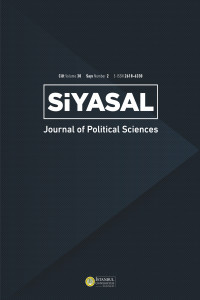Competing Policies towards the Muslim Brotherhood in the Gulf: The Cases of Qatar and the United Arab Emirates
Abstract
The United Arab Emirates (UAE) and Qatar are similar in many aspects, including social structure, political life, and religious identity. However, there exists a considerable difference in their foreign policies toward one of the most important regional non-state actors, the Muslim Brotherhood. Since its independence in 1971, Qatar has developed strong relations with the Muslim Brotherhood organization. On the other hand, some of the Gulf countries, including the UAE, Saudi Arabia, and Bahrain, have remained skeptical toward having good relations with the movement. Particularly, after the Arab revolutions of 2011, the Emirati leadership pursued an anti-Muslim Brotherhood policy together with other regional allies. During this period, Qatar was under severe criticism as a consequence of its support for the Muslim
Brotherhood movement. This distinction might be observed comprehensively in practice, yet it has not been adequately examined in a historical and ideological context. There is a lack of studies on the core determinants of Qatar and the UAE’s policy toward the Muslim Brotherhood. In light of this gap in literature, this work seeks to clarify why these two countries have such diverging policies toward the movement. Therefore, this study focuses on how the policies of Qatar and the UAE toward the Muslim Brotherhood diverged significantly, particularly in the past two decades.
References
- Commins, D. (2012). The Gulf States; A Modern History. New York: I.B. Tauris.
Körfez’de Müslüman Kardeşler’e Karşı Çatışan Politikalar: Katar ve Birleşik Arap Emirlikleri Örnekleri
Abstract
Birleşik Arap Emirlikleri (BAE) ve Katar pek çok noktada benzerliklere sahip olmakla birlikte bölgesel politikalarda önemli farklılıkları olan iki ülkedir. Bu farklılıklar arasında en belirgin olanı iki ülkenin bölgenin en geniş toplumsal tabana sahip hareketlerinden olan Müslüman Kardeşlere yönelik politikalarıdır. Müslüman Kardeşler hareketiyle olumlu ilişkileri bulunan Katar, bu politikayı bağımsızlığını kazandığı 1970’li yıllardan bu yana sürdürmektedir. Doha yönetiminin Müslüman Kardeşlere desteği özellikle 2011 yılındaki Arap devrimleri sonrasında artmıştır. Buna karşın BAE, Bahreyn ve Suudi Arabistan gibi Körfez ülkeleri Müslüman Kardeşler hareketinin siyasi bir aktör olmasını engellemeye çalışmış ve hareketin Ortadoğu genelinde siyasi ve sosyal süreçlerden dışlanmasına yönelik politika yürütmüştür. Aralarındaki
farklılıklar pratikte kapsamlı bir şekilde gözlemlenebilse de tarihsel arka planıyla ve ideolojik bağlamda yeterli derecede incelenmemiştir. Bu nedenle Katar ve BAE’nin Müslüman Kardeşlere yönelik politikasının dinamiklerini inceleyen çalışmaların literatüre katkısı olacağı düşünülmektedir. Buradan hareketle bu çalışma söz konusu iki ülkenin Müslüman Kardeşler hareketine yönelik politikalarının neden farklılaştığını tarihsel bir perspektifle ele almaktadır. Katar ve BAE’nin Müslüman Kardeşler hareketine karşı politikalarının nasıl ve neden önemli farklılar gösterdiği, iki ülkenin harekete yönelik politikalarını şekillendiren temel dinamiklerin ne olduğu bu çalışmanın temel araştırma konusudur.
References
- Commins, D. (2012). The Gulf States; A Modern History. New York: I.B. Tauris.
Details
| Primary Language | English |
|---|---|
| Subjects | Political Science |
| Journal Section | Articles |
| Authors | |
| Publication Date | October 30, 2021 |
| Submission Date | February 9, 2021 |
| Published in Issue | Year 2021 Volume: 30 Issue: 2 |

